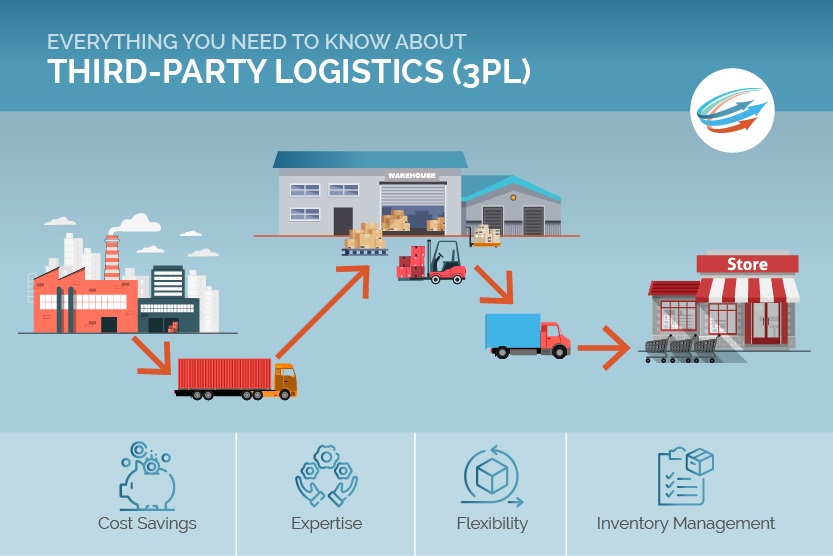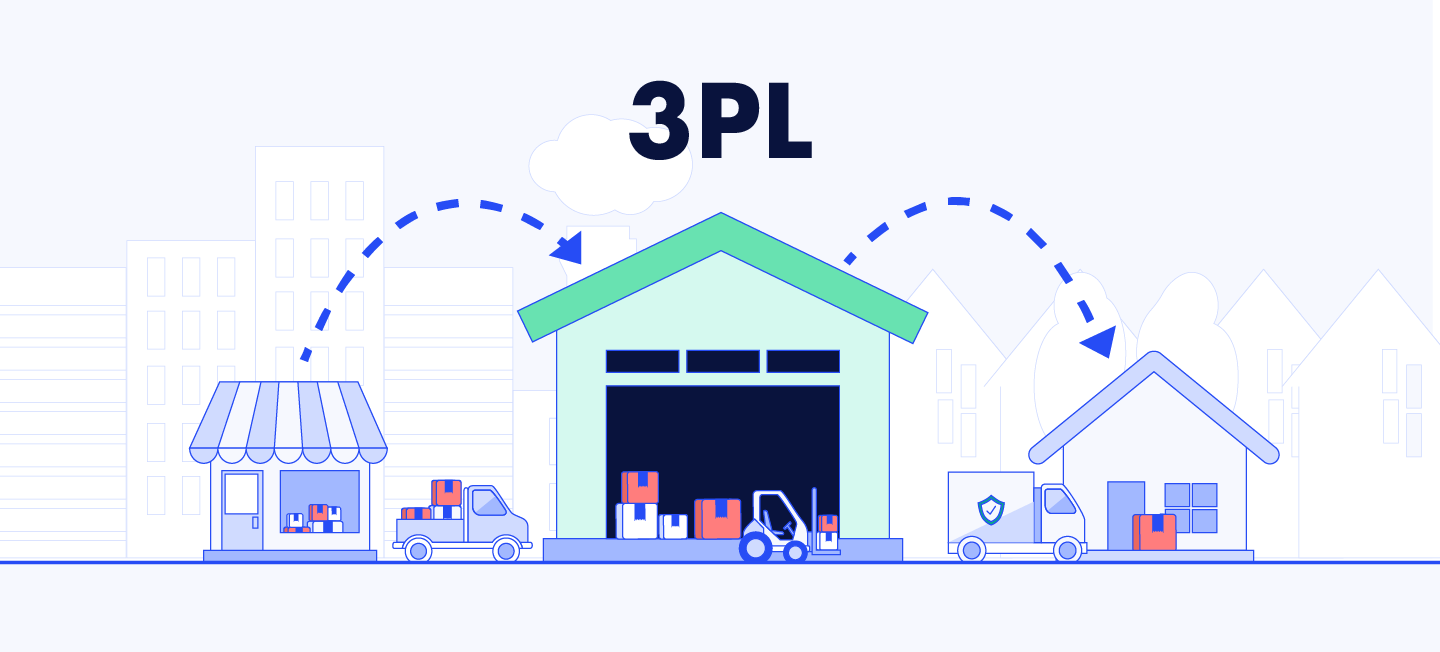Third-Party Logistics (3PL) Services: The Key to Efficient Supply Chain Management
In today’s fast-paced business environment, efficient logistics and supply chain management have become essential for companies looking to thrive and stay competitive. One of the most strategic ways businesses achieve this is by partnering with Third-Party Logistics (3PL) providers. These specialized service providers offer a range of solutions to manage storage, transportation, and distribution, enabling businesses to focus on their core operations.
This article will delve into what 3PL services are, the benefits they offer, how to choose the right 3PL provider, and how to integrate 3PL into your business for optimal efficiency.

What is Third-Party Logistics (3PL)?
Third-Party Logistics (3PL) refers to the outsourcing of logistics and supply chain management functions to a third-party provider. These providers are experts in the areas of warehousing, transportation, inventory management, and distribution.
Instead of handling logistics operations in-house, businesses can partner with a 3PL provider to streamline their supply chain. This allows businesses to reduce overhead costs, improve efficiency, and focus on their core competencies.
Common Services Offered by 3PL Providers:
- Warehousing and Storage: 3PL providers typically offer storage solutions in strategically located warehouses.
- Inventory Management: These providers monitor stock levels, manage reordering processes, and track inventory in real-time.
- Order Fulfillment: Picking, packing, and shipping products to customers.
- Transportation Management: 3PL providers coordinate shipments using various transportation methods (e.g., truck, rail, air, sea).
- Reverse Logistics: Managing product returns and exchanges.
- Customs Clearance: Handling international shipping requirements and compliance with customs regulations.
Why Should You Consider 3PL Services?
Outsourcing logistics functions to a third-party provider offers numerous advantages, especially for small and medium-sized businesses. Here are the key benefits of using 3PL services:
1. Cost Savings
Managing a logistics operation in-house can be expensive. Companies need to invest in warehouse space, equipment, labor, technology, and transportation. By partnering with a 3PL provider, businesses can eliminate these upfront costs. Additionally, 3PL providers benefit from economies of scale, which enables them to offer more affordable rates for shipping, warehousing, and other logistics services.
2. Focus on Core Business Functions
Outsourcing logistics allows businesses to focus on what they do best—whether it’s manufacturing, sales, or customer service—while leaving the complexities of supply chain management to experts.
3. Scalability and Flexibility
As your business grows, so do your logistics needs. With 3PL services, you have the flexibility to scale your operations up or down based on demand. Whether you’re launching new products or expanding into new markets, 3PL providers can adapt to your changing needs.
4. Expertise and Technology
3PL providers leverage cutting-edge technologies like warehouse management systems (WMS), transportation management systems (TMS), and order management software to optimize logistics operations. Their expertise in supply chain management ensures your products are handled efficiently and cost-effectively.
5. Improved Customer Service
By outsourcing your logistics operations, you can improve delivery times and order accuracy, which ultimately enhances customer satisfaction. Timely, accurate deliveries contribute to positive customer experiences, driving repeat business.
Types of 3PL Services
There are several different types of third-party logistics services, each tailored to specific business needs. Depending on your industry and business model, you may require a specialized 3PL service.
1. Standard 3PL Providers
A standard 3PL provider offers basic logistics services, including transportation, warehousing, and inventory management. This type of provider is suitable for businesses looking for a straightforward logistics solution without additional complexities.
2. Service Developers
Service developers go beyond the basics by offering value-added services such as customized packaging, labeling, and kitting. These 3PL providers also offer advanced inventory and order management systems that help businesses streamline their operations.
3. Customer Developers
These providers focus on specific industries and offer specialized logistics services tailored to the unique needs of those industries. For instance, a customer developer might focus on cold chain logistics for perishable goods or hazardous materials handling for the chemical industry.
4. Lead Logistics Providers (LLP)
Lead Logistics Providers offer end-to-end supply chain management, including sourcing, transportation, warehousing, and inventory management. They take on a more integrated role, often overseeing the entire supply chain and working closely with other suppliers and vendors.

How to Choose the Right 3PL Provider
Choosing the right 3PL provider is crucial for your business’s success. The right partner can drive efficiency, improve customer satisfaction, and help you scale effectively. Here are some important factors to consider when selecting a 3PL provider:
1. Evaluate Experience and Reputation
Look for a 3PL provider with a proven track record in your industry. Review their customer testimonials and case studies to get a sense of their capabilities and reliability.
2. Technology and Integration
Your 3PL provider should have the latest logistics technologies to ensure efficient order processing, tracking, and inventory management. Check if their systems can easily integrate with your existing software or enterprise resource planning (ERP) systems.
3. Flexibility and Scalability
A great 3PL provider should offer scalable services that grow with your business. Whether you’re expanding to new markets or handling seasonal fluctuations, your provider must be adaptable.
4. Cost Structure
Understanding the cost structure of your 3PL provider is essential. Some providers charge per order, while others may use a flat monthly rate. Be clear about the pricing model and ensure it aligns with your budget.
5. Customer Service
Effective customer service is essential for a smooth partnership. Ensure that your 3PL provider offers robust support channels, including a dedicated account manager, helpdesk, and clear communication protocols.
Key Technologies in 3PL Services
Technology plays a vital role in the efficiency and effectiveness of third-party logistics. Here are some key technologies that 3PL providers leverage:
1. Warehouse Management Systems (WMS)
WMS software enables 3PL providers to track inventory, optimize storage, and streamline order picking and packing processes.
2. Transportation Management Systems (TMS)
TMS helps 3PL providers plan, execute, and optimize the transportation of goods. This system improves delivery times and reduces transportation costs.
3. Automation and Robotics
Many 3PL providers have adopted automation and robotics to enhance warehouse operations, such as robotic picking systems and automated guided vehicles (AGVs).
4. Real-Time Tracking and Visibility
Real-time tracking and visibility tools allow businesses to track shipments and inventory in real-time, ensuring that goods are delivered on time and customers receive updates on the status of their orders.
.png)
FAQ: Third-Party Logistics (3PL) Services
Q1: What is the difference between 3PL and 4PL?
A1: A 3PL provider handles logistics functions like transportation, warehousing, and inventory management, while a 4PL provider manages the entire supply chain, including overseeing the 3PL provider and other vendors.
Q2: Is 3PL suitable for small businesses?
A2: Yes, 3PL services are beneficial for small businesses looking to streamline logistics, reduce costs, and improve efficiency without investing heavily in infrastructure.
Q3: Can I switch 3PL providers if I am unhappy with their service?
A3: Yes, you can switch 3PL providers if you are not satisfied with their service. However, it is important to plan the transition carefully to minimize disruption to your operations.
Conclusion
Partnering with a Third-Party Logistics (3PL) provider is a game-changer for businesses looking to optimize their supply chain, reduce costs, and focus on growth. By leveraging the expertise, technology, and scalability that 3PL services offer, businesses can ensure smooth operations, enhanced customer experiences, and improved efficiency.
To learn more about how 3PL services can transform your supply chain, check out these resources:

